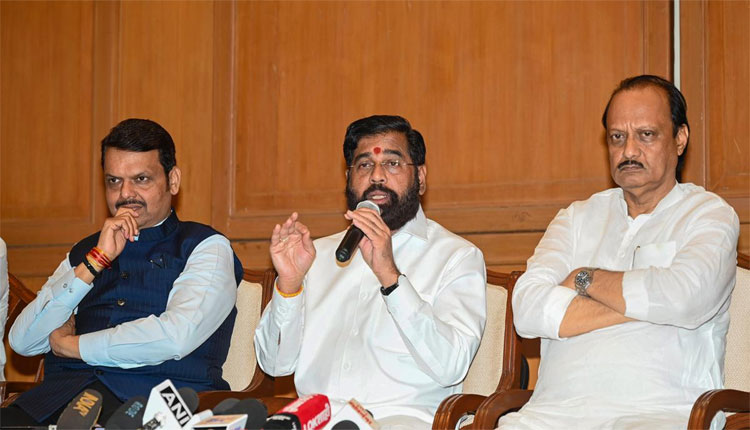Mumbai: With Union Home Minister Amit Shah’s recent visit to Maharashtra, it has become evident that the Bharatiya Janata Party (BJP) plans to contest the upcoming state elections in alliance with Chief Minister Eknath Shinde’s Shiv Sena faction and Ajit Pawar’s Nationalist Congress Party (NCP). However, while the alliance partners have been confirmed, the seat-sharing arrangement remains unresolved.
The BJP has set a target under “Mission 160” for the upcoming elections, but realising this goal will require strategic negotiations. Both the Shiv Sena and NCP factions have put forth their demands for a significant number of seats, raising questions about how many seats the BJP will retain for itself.
Amit Shah recently held a meeting with the BJP core group in Mumbai, where he discussed the strategy and potential seat-sharing with allies. The final formula is expected to be decided in Delhi, following this state-level meeting. All eyes are now on the BJP’s decision regarding the number of seats it will contest.
Past Election Trends and Changing Dynamics
An analysis of the BJP’s performance in the last three Maharashtra Assembly elections reveals a significant shift in the party’s status. Before 2014, the BJP played the role of a junior partner to Shiv Sena, contesting fewer seats. In 2004, the BJP contested 111 out of 288 seats, while Shiv Sena fielded candidates in 163. In 2009, the BJP contested 119 seats, with Shiv Sena taking 160.
However, this dynamic changed dramatically in 2014 when the BJP and Shiv Sena contested separately. The BJP fielded candidates in 260 seats and won 122, marking the first time it surpassed the 100-seat mark in Maharashtra and establishing its Chief Minister for the first time.
In 2019, when the BJP and Shiv Sena contested together again, the BJP fielded candidates in 164 seats and won 105. Although the BJP emerged as the senior partner, its overall tally fell compared to the previous election, highlighting the challenges of coalition politics.
Seat-Sharing Dilemmas and Alliance Complications
The BJP’s current strength spans approximately 240 seats in Maharashtra, but it faces significant challenges due to opposition unity. This has compelled the party to seek alliances. In the 2024 Lok Sabha elections, a seat-sharing agreement saw the BJP contest 28 of Maharashtra’s 48 parliamentary seats, while Shiv Sena contested 15, NCP 4, and Rashtriya Samaj Paksha 1. There is speculation that this formula could be adapted for the Assembly elections, but resistance from the Shiv Sena and NCP factions complicates the matter.
Chief Minister Eknath Shinde’s Shiv Sena faction is reportedly demanding 100 to 110 seats, while Ajit Pawar’s NCP faction is seeking 60 to 70 seats. If these demands were met, the BJP would be left with only 100 to 110 seats, a formula the party is unlikely to accept given its ambition to win 160 seats.
To achieve its target, the BJP is considering a distribution where it retains 150 seats while allocating 70 seats to Shiv Sena, 60 to NCP, and 8 to smaller parties. This arrangement would allow the BJP to maintain its “big brother” status within the National Democratic Alliance (NDA), but agreeing on this formula will not be easy.
Mission 160: The BJP’s Road Ahead
The BJP is keenly aware that contesting fewer than 160 seats could reduce its chances of securing more than 100 seats in the assembly. The party’s strategy involves careful negotiation to ensure it retains a majority while accommodating its alliance partners. As negotiations continue, the BJP’s ability to balance its own electoral ambitions with those of its allies will be crucial to its success in the upcoming Maharashtra elections.



Comments are closed.